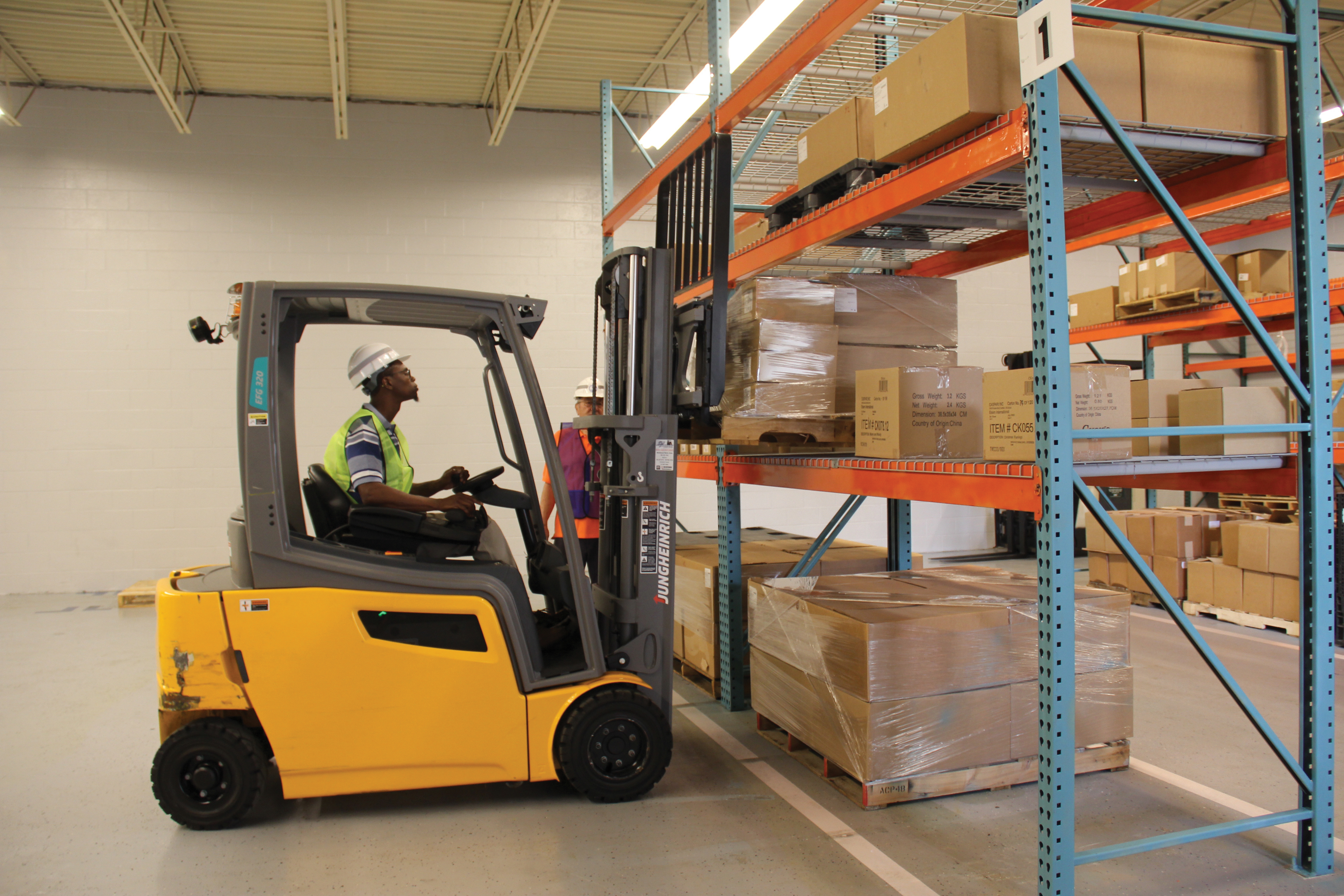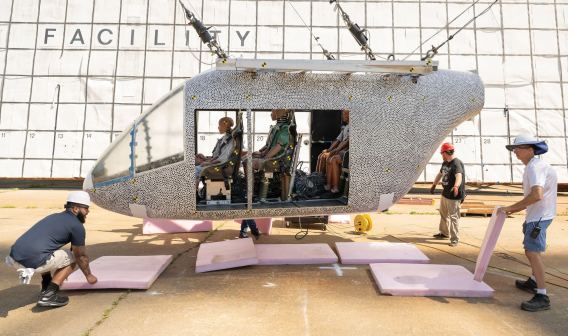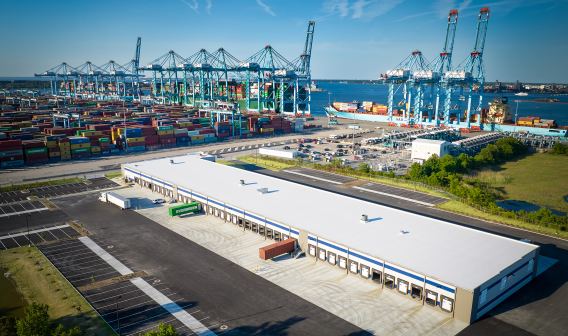A Soft Landing for Military Veterans
Virginia state programs help vets use their experience to land logistics, infrastructure jobs

The Virginia Community College System provides logistics training for veterans and non-veterans alike, with Paul D. Camp (pictured), Tidewater, and Virginia Peninsula community colleges serving the veteran-heavy Hampton Roads region.
Sam Northington doesn’t want any military veteran to struggle like his dad did. After 20 years in the U.S. Air Force, his father retired as a master sergeant and went back to college to get his teaching credentials.
“That didn’t really fit him. He never really taught,” Northington recalled. “From there, he went on to be a mechanic and then ended up selling furniture off a rental truck.”
Northington is the Virginia Infrastructure Academy coordinator for the Virginia Community College System (VCCS), charged with creating and aligning certificate training programs to match the state’s community and business needs. Part of his job is charting pathways for veterans like his father, who are looking for their second act after leaving service.
“I wish there had been someone to let my dad know there were multiple career opportunities available to him,” Northington said. “That probably would have provided him with better opportunities than he had.”
A Ready-Made Workforce
Virginia has the second-largest population of veterans in the country, with nearly one out of every 10 residents a former service member. The state’s community colleges and veteran job training programs are working in concert with industry to offer veterans numerous options for retraining, within months or even weeks, to well-paying civilian trades and careers in the infrastructure and logistics industries and beyond.
“Our programs allow veterans to get short-term training for long-term careers, so when they’re about to transition out, they can enter a field of their choosing very, very quickly,” Northington said.
It helps that former service members tend to have the qualities employers desire. “One of the most common requests I get from employers is, ‘Can you send me somebody who’s going to show up every day on time, try their best, and do a good job?’” Northington said. “Well, the military is used to doing that. There’s no need to worry about that.”
One of the most common requests I get from employers is, “Can you send me somebody who’s going to show up every day on time, try their best, and do a good job?” Well, the military is used to doing that.
Veterans can take several paths toward higher education and preparing for careers at any of Virginia’s 23 community colleges. One common path is an associate’s degree, which can lead to a job or serve as a stepping stone to a bachelor’s degree.
Vets can also pursue a noncredit workforce credential through the FastForward program, which pays for up to two-thirds the cost of select credentialing programs at local community colleges. VCCS trains for more than 600 industry-related credentials, and about 170 meet the FastForward criteria, said VCCS Associate Vice Chancellor of Career Education and Workforce Programs Randall Stamper. Those criteria include:
- The credential is directly aligned with a specific occupation or occupational cluster that the labor market data shows is going to grow
- There’s been reasonable growth in that occupation over time
- Businesses in the region are willing to provide letters of support, attesting that the credentialing program at a local college represents the skills they want to hire for
“We only fund those credentials that are reasonably going to get you into an entry-level job, or maybe a slightly advanced job, in an industry that you can then build a career out of,” Stamper said.
The programs generally range in length from six to 10 weeks. Careers covered by FastForward logistics offerings include commercial truck driving, remote pilot operation, site management, and numerous careers related to road maintenance, like flagging and paving.
Collectively, FastForward enrolled 15,753 program participants last year, a 17% increase from 2023 and the most since the program’s inception, according to a recent report from the State Council of Higher Education for Virginia. Median annual wages for participants increased $10,551, or 50%, in the 12 months following program completion, the report stated.
These students are older than average, with a median age of 34, and most have dependents, Stamper said. They’re also more likely than average community college students to be receiving Supplemental Nutrition Assistance Program or other public benefits.
“They’re adults, they’ve had kids, and they want to stop working two or three low-wage jobs and find a way into a career,” he added.
Helping Military Families
Joe Sanders works directly with these students as an instructor and the assistant coordinator of the Manufacturing and Logistics programs at two Richmond-area community colleges, Brightpoint and J. Sargeant Reynolds, through the colleges’ shared workforce development division, the Community College Workforce Alliance (CCWA). The vast majority of program enrollees on both campuses attend for free with the help of state grants, he said.
Sanders, a veteran himself, sees his job as helping the whole family — at all stages of military and post-military life. “We love our active military and veterans, but we also do not want to forget about the dependents who are looking for opportunities as well,” he said.
CCWA aims to make course offerings fit the population — whether that’s scheduling 5:30 a.m. classes online so active service members can attend before they start their day, launching military cohorts in logistics programming, or informing the military population that credentialing programs are available regardless of rank or status.
“Some of those people have been out for six months. Some have been out for five years,” Sanders said. “For us, it’s no different. They’re out. They’re looking for an opportunity. How can we help?”
Vets can see how their military experience translates into college credits or credit toward a certification through a portal called Credits2Careers. The portal also shows potential college credits for FastForward certifications, if a vet had pursued that route before going for a degree.
“One of the things we hear all the time is the military and industry, they’re speaking different languages,” said Emily Jones-Green, coordinator for the Credit for Prior Learning program at the state’s community colleges.
Credit for Experience
The portal helps to bridge that gap, said Jones-Green. “The students are able to say, ‘This is what my military career was, and this is how I would be able to put this in a civilian industry language,’” she said. Conversely, if someone from the civilian business world were talking to a veteran, “They could say, ‘You were an E-5. I know what an E-5 is now. Let’s talk about how that would be relevant to this industry and what your path to promotion would be within our organization.’”
As an example, Jones-Green dropped the military resume of her brother, a U.S. Coast Guard veteran, into the portal. Within seconds, a list of colleges and applicable credits appeared, showing that the applicant would already have credits toward programs and degrees as diverse as an infrastructure certification, a program at Tidewater Community College in power motor tools and repair, and 21 credits toward an associate’s degree in applied science and information technology. For those vets who want to go into a field not directly related to their military experience, she said, a technical studies degree often allows for maximum usage of credit for prior learning.
The Credits2Careers initiative allows veterans “to shorten their amount of time in the classroom and then get into the labor market and the workforce a lot quicker,” she said.
The hope is that it encourages Virginians as well as folks originally from other states to make a home in Virginia after their military service ends.
“Some will come out of the military and want to go right into education,” Sanders said. “Some will come out and want to go to work. Some will come out and want to try taking night classes and still work. We want to make sure we give them as many opportunities as we can.”
Wherever a vet is from, whatever he or she hopes to do post-military, the state of Virginia wants to meet them where they are — and hopes they will remain in the Commonwealth.
“If they’re not from here, and we’re able to tell them, ‘Hey, we can give you this credit and help you get your degree,’ they might be more likely to stay here and be part of the Commonwealth and contribute back to the area,” said Jones-Green.




